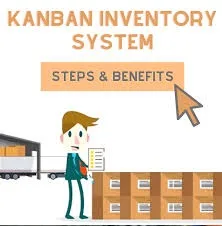Smooth operations and optimized inventory are crucial factors for any thriving business. As competition stiffens, companies are constantly searching for methodologies that streamline processes and ensure a lean inventory. Kanban inventory management stands out as a powerful tool for handling materials and resources effectively. In essence, it supports businesses in maintaining an ideal balance between demand and supply. Below, we explore how the implementation of Kanban systems can lead to substantial improvements within a company’s operations.
Understanding Kanban Inventory Management and Its Core Principles

Kanban inventory management, originally developed in Japanese manufacturing, uses visual cues like cards to signal when it’s time to reorder or produce more items. This method supports a pull system that aligns production with actual demand, reducing excess inventory and promoting just-in-time production, a key aspect of lean manufacturing.
By making inventory flow visible to all team members, Kanban encourages collaboration and reduces errors in ordering. This transparency allows issues to be addressed proactively, fostering alignment across departments and improving overall efficiency in meeting customer needs.
Enhancing Efficiency and Throughput with Kanban Inventory Management
Kanban inventory management improves operational efficiency by minimizing tracking time and focusing on productive tasks. Its visual system identifies bottlenecks and delays, allowing for swift resolution. Kanban also enhances throughput by limiting work-in-progress and ensuring a smooth flow of work, reducing lead times and increasing customer satisfaction. It promotes a pull system, allowing work to be pulled as capacity permits, preventing overburdening and reducing burnout.
This system empowers employees to focus on quality rather than quantity, contributing to overall efficiency. Clear visual communication eliminates confusion and excessive meetings, allowing more time for value-adding activities, directly impacting the bottom line through improved productivity and efficiency.
Reducing Waste and Minimizing Overstock with Kanban
Kanban is a lean inventory management system that streamlines inventory management, identifying unused materials and eliminating them, ensuring efficient use of space and resources. Its just-in-time nature minimizes overstock and inventory risk. Kanban aligns with the economic order quantity (EOQ) model, aiming for the optimal number of units to order to minimize total inventory holding and ordering costs.
By integrating Kanban with inventory metrics, businesses can maintain tighter control over stock levels, leading to a more organized and waste-free inventory. Kanban directly addresses overproduction, reducing waste and increasing profitability by producing only what is needed when needed. It promotes a more sustainable business model, reducing environmental footprint and financial benefits.
Improving Responsiveness to Customer Demand Through Kanban Systems

Kanban is a system that enables companies to quickly respond to customer demand by providing real-time inventory levels. This allows companies to adjust their output to meet customer needs, ensuring popular items are always in stock. Kanban also enables companies to identify trends and shifts in consumer behavior, providing a competitive advantage.
This customer-centric approach allows for quick feedback incorporation into the production cycle, prompting immediate replenishment if a product sees a sudden spike in demand. Kanban also enhances overall supply chain responsiveness by reducing lead times and ensuring more flexible production schedules, allowing companies to react to market changes faster than competitors using traditional inventory management methods.
Successful Implementations of Kanban in Various Industries
Kanban is a versatile system that has been adopted across various industries, including retail, healthcare, manufacturing, and software development. Retailers have seen improved stock levels and reduced out-of-stock incidents by implementing Kanban systems, which optimize shelf space and reduce clearance items. Healthcare has streamlined the management of medical supplies, ensuring critical stock levels and improved patient care.
Manufacturing has seen significant improvements in production flow and reduced lead times, leading to quicker turnaround times and a robust system for continuous improvement. In software development, Kanban principles have been adapted with methodologies like Scrum and Scaled Agile Framework, demonstrating the system’s adaptability to various operational models.
Overall, Kanban inventory management proves to be a transformative approach for businesses aiming to optimize efficiency and align closely with customer demands. By minimizing waste, enhancing throughput, and improving responsiveness, Kanban stands as a testament to intelligent system design. As operations become more complex, the simplicity and clarity offered by Kanban are invaluable in navigating the challenges of modern business environments.





